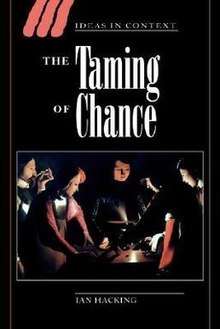The Taming of Chance
 Cover of the first edition | |
| Author | Ian Hacking |
|---|---|
| Language | English |
| Subject | History of probability |
| Published | 1990 |
| Media type | Print (Hardcover and Paperback) |
| Pages | 282 |
| ISBN | 978-0521388849 |
The Taming of Chance is a 1990 book about the history of probability by the philosopher Ian Hacking. It is a sequel to his earlier The Emergence of Probability (1975). The book received both positive and mixed reviews.
Summary
Hacking provides an account of an important period in the history of probability,[1] showing special concern with the philosophy of indeterminacy.[2] He shows that the modern argument for preferring facts to testimony in science assumes probabilistic thinking.[3]
Reception
The Taming of Chance has been described as ground-breaking.[1] D. V. Lindley reviewed the book in Nature.[4] M. Schabas reviewed the book in Science.[5] Stephen P. Turner reviewed the book positively in the American Journal of Sociology, writing that it was useful for both sociologists of science and historians of social science, and that while Hacking's arguments were open to objections, Hacking was "too sophisticated" to be caught by them.[6] The historian of science Theodore M. Porter reviewed the book in American Scientist.[7]
Bruce Kurlick gave The Taming of Chance a mixed review in American Historical Review, noting that it was a sequel to Hacking's earlier The Emergence of Probability. Kurlick praised Hacking for the "richness of his ideas" and credited him with mastering complicated literature in several languages and "meticulous scholarship" superior to that of Michel Foucault, to whom Hacking was indebted. However, he considered the book a "strain to understand" and criticized Hacking for giving insufficient emphasis to the role of the hospital in "acclimating the public to chance and probability", and for his "penchant for irrelevant anecdotes" and poor judgment about how to write about the past.[8] Timothy L. Alborn reviewed The Taming of Chance positively in Isis, writing that Hacking had a "vibrant writing style" and presented a "wealth of material". However, he also wrote that Hacking's book left many questions unanswered.[9]
References
Footnotes
- 1 2 Macintosh 2005. p. 357.
- ↑ Smith 1997. p. 970.
- ↑ Welsh 1994. p. 45.
- ↑ Lindley 1991. p. 202.
- ↑ Schabas 1991. p. 1373.
- ↑ Turner 1991. pp. 551-553.
- ↑ Porter 1992. p. 90.
- ↑ Kurlick 1992. p. 157.
- ↑ Alborn 1992. pp. 366-367.
Bibliography
- Books
- Macintosh, Jack (2005). Honderich, Ted, ed. The Oxford Companion to Philosophy. Oxford: Oxford University Press. ISBN 0-19-926479-1.
- Smith, Roger (1997). The Norton History of the Human Sciences. New York: W. W. Norton & Company. ISBN 0-393-31733-1.
- Welsh, Alexander (1994). Freud's Wishful Dream Book. Princeton: Princeton University Press. ISBN 0-691-03718-3.
- Journals
- Alborn, Timothy L. (1992). "Book reviews: Sociology & philosophy of science". Isis. 83 (2). doi:10.1086/356189. – via EBSCO's Academic Search Complete (subscription required)
- Kurlick, Bruce (1992). "Reviews of books: General". American Historical Review. 97 (1). – via EBSCO's Academic Search Complete (subscription required)
- Lindley, D. V. (1991). "Umbugology and ditchwateristics". Nature. 349 (6306). – via EBSCO's Academic Search Complete (subscription required)
- Porter, Theodore M. (1992). "The Taming of Chance (Book)". American Scientist. 80 (1). – via EBSCO's Academic Search Complete (subscription required)
- Schabas, M. (1991). "The idea of the normal". Science. 251 (4999). doi:10.1126/science.251.4999.1373. – via EBSCO's Academic Search Complete (subscription required)
- Turner, Stephen P. (1991). "The Taming of Chance (Book)". American Journal of Sociology. 97 (2). – via EBSCO's Academic Search Complete (subscription required)